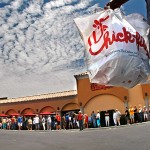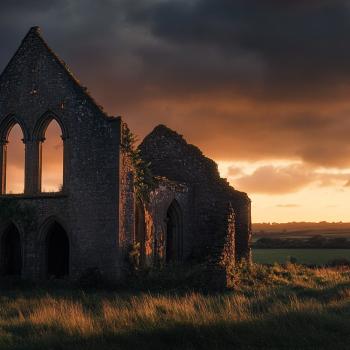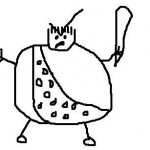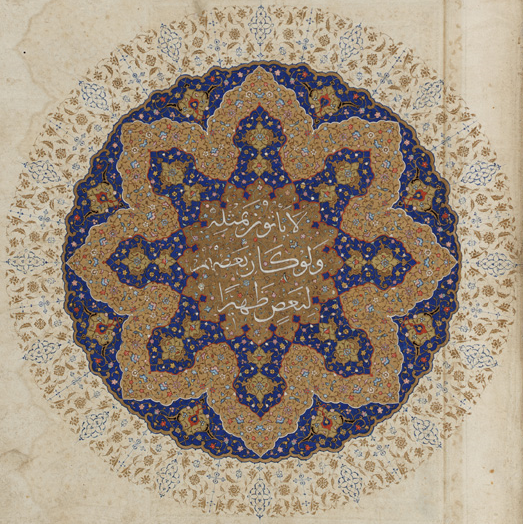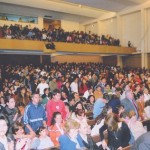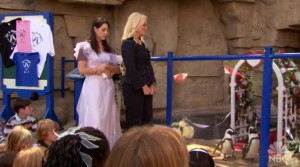
Chick-fil-A sent ripples through my church in the early noughties; I still have no real idea why. Perhaps they had just opened more stores in our area. Perhaps it was a purposeful effort to acquire our support as the conservative Christian demographic. At the time, I innocently believed it was just happiness on the part of the health conscious in our congregation that they could access a leaner burger. Now, I think it was more likely that word was spreading that a Good Christian Company was achieving success and we should support it.
In a spectacular flap that knocked the gaffes of Mitt Romney and Barack Obama off the airwaves, Chick-fil-A just became notorious for its anti-gay political funding and the open statements of its CEO, Dan Cathy, promoting “biblical marriage” (as if there is such a thing). But I don’t care about Dan Cathy. I’m not going to write about Chick-fil-A. I’m going to write about the trenches of the culture war. In particular, what “hate” means to people on both sides.
“Love” and “hate” are the least transparent terms in the fundamentalist Christian arsenal.

Evangelical Christians will tell you they “love everybody” – a metaphysical expansion on the idea of “loving one’s neighbor” that, when distilled, leaves only a light, powdery residue of warm, fuzzy feelings. When I was a kid, loving everybody meant meticulously scanning the names of people I had met through my head, and making sure none of those names drew a flash of anger. If it did, I was obviously bitter and needed to repent before I’d miss the rapture. In case you didn’t notice, it was all about me. Some love.
“Hate,” on the other hand, is something Christians must never feel. The recent proliferation of “love the sinner, hate the sin” rhetoric indicates that there has been some movement toward authorizing forms of hatred in the evangelical community, but the accusation of “hate” still troubles many conservatives.
“I don’t hate gay people,” they say. “I just don’t think it’s right for them to get married.”
Similarly, fundamentalists like Doug Wilson argue that they can’t be misogynist because they have daughters who like them. Arguments can be and probably have already been made about the “benevolent” slave master and how racism can persist amongst people who have no idea that they’re racist. When pressed, they’ll say, “I don’t hate people of color!” but they still lock their doors and speed through certain neighborhoods.
Do the supporters of gay marriage in the Chick-fil-A controversy think that Dan Cathy and all the conservative Christians who applaud him are frothing in a frenzy of personal rage? I don’t think so, although I do bet there’s a fair amount of spite operating in the extra custom the restaurants are receiving from their religious allies. Here’s the thing. “Hate,” that personal wellspring of indignation and contempt, is not the point of the controversy. It’s easy to deflect the charge of “hate” when you view it in terms of a personal vendetta.
But what if, instead of “hate,” we talked about structural violence?

Structural violence describes systems of inequality: societies that deny certain groups access to civil rights, that exploit them for the benefit of advantaged groups, that exclude individuals from the benefits of society in a way that singles them out from the privileged elite.
Racism, for example, is structural violence. Kiese Laymon’s essay How to Slowly Kill Yourself and Others in America: A Remembrance provides a window to the kinds of structural disadvantages piled up on young black men before they have become fully formed adults. And how those disadvantages can lead directly to violent assault and death.
Patriarchy is another example of structural violence. Christian patriarchy supporters would never tell you that they hate women. If they admit to it, they’ll say it’s only “worldly” women whose “sin” they hate. Except there are real-world consequences to the so-called “complementarian” belief that women belong in the home, submissive and maternal. It means women can’t get jobs. Can’t advocate for themselves by running for office. Can’t leave husbands because they financially depend on them, no matter how abusive. Can’t limit their pregnancies, even if they nearly die giving birth. The result? Women are poorer, less educated, less equipped to support themselves, less healthy and incur a greater risk of death, disability and poverty under patriarchy.
Opposing gay marriage means supporting an environment that is structurally violent to gay people. Marriage affords security, financial stability, emotional stability, public recognition, and legal decision-making power. Shane Bitney Crone has written an essay and made a video to illustrate the unimaginable pain of being denied the ability to make decisions for and even pay his respects at the funeral for the man he loved, because the law said his partner’s estranged, anti-gay parents were “closer” to him than his partner of six years.
Opposing gay marriage means throwing roadblocks in the way of couples who would like to adopt children – which actually prevents children in foster care from accessing much-needed loving homes, too! When you argue against gay couples’ marriage or adoption rights, you are implicitly making the claim that you are qualified to judge a stranger’s worthiness to parent. Did the judge look at you askance when you applied for your wedding license? Did anyone tell you that your marriage had better not produce children, because having you for a parent would ruin them?
The point is this: opposing equal rights for LGBTQ people means placing them at a severe social disadvantage. It means singling them out as an inferior class. That is violent – but in that subtle, smiling way that says, “I’m doing this for your own good.” It’s not the blunt force trauma of open, personal hatred, the baseball bat that hits you in the face but will eventually heal. “Hate” can barely begin to describe the acid burn of discrimination. It whittles away at your soul, turning supposed friends and loved ones against you, denying your right to voice your pain, insisting that if you could just be different you would be accepted like everyone else.
The truth is, I would rather take a baseball bat to the face. I would rather live in a world where some people fervently hate me, but the rest recognize my rights as a free and equal citizen. Why should gay people care whether or not evangelical Christians hate them? It’s not about emotion. It’s about survival.
Disadvantaged people don’t care that you don’t hate them.


